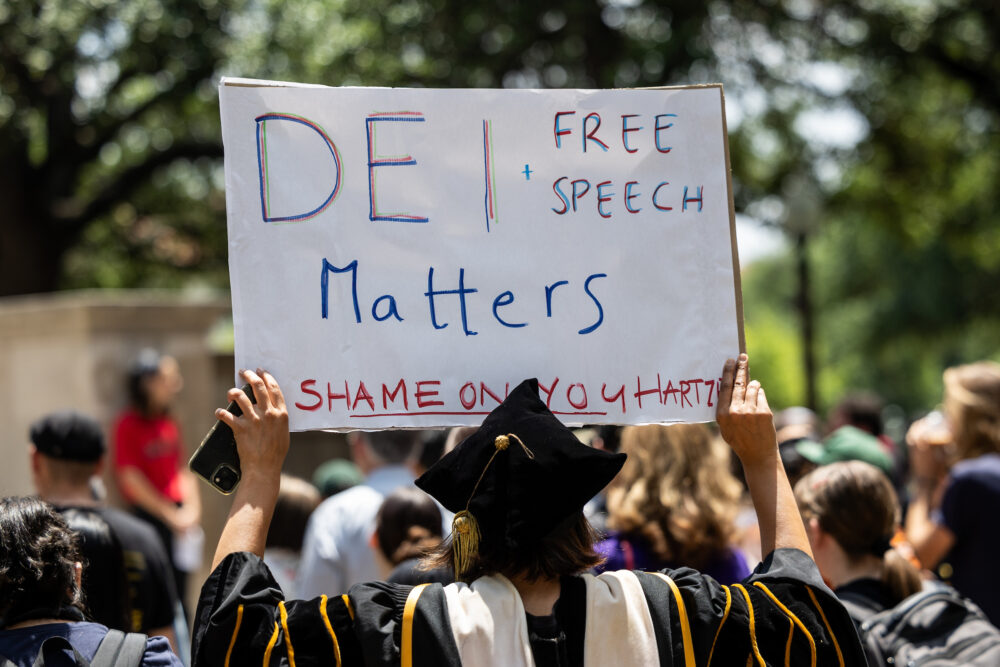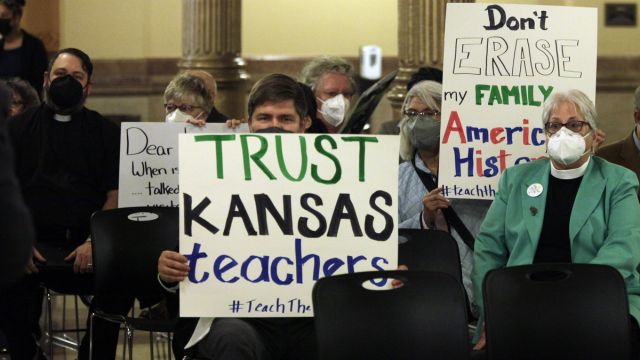University professors across the political spectrum in Texas are preemptively self-censoring themselves for fear of damaging their reputations or losing their jobs, according to a new survey from the Foundation for Individual Rights and Expression, a First Amendment advocacy group.
According to FIRE, the study on the atmosphere of academic freedom and free speech on campuses received responses from more than 6,200 professors nationwide, making it one of the biggest of its type. More than 165 professors from Texas A&M University in College Station, almost 50 professors from the University of Texas at Dallas, and more than 200 professors from the University of Texas in Austin were among the respondents.
According to poll data, 27% of respondents felt unable to speak freely out of concern for the reactions of students or administrators, and 35% of all respondents stated they recently toned down their work out of fear of controversy. A misunderstanding might cost over 25% of academic members their careers.
Teachers at Texas colleges were more concerned. More than half of the faculty members at UT-Austin who responded stated that they sometimes or frequently keep their ideas to themselves out of concern for the reactions of others. In order to avoid criticism, over half of the UT-Dallas faculty members who responded stated they had softened their writing.
“Faculty are not conflating self-censorship with being polite or professional that would be categorically different,” said the report. “Rather, consistent proportions of faculty report that they are likely to refrain from sharing their views in various professional and conversational contexts for fear of social, professional, legal, or violent consequences.”
According to FIRE, higher education cannot continue in this environment.
“The academy needs courageous faculty who are not afraid to research, write about, or teach topics that some may shy away from because they are labeled as controversial to ask and investigate unasked and unanswered questions,” the report’s conclusion states. Additionally, the academy needs more professors who aren’t scared to stand by colleagues who are scared or who have been singled out and criticized for their academic or speech-related activities. It wouldn’t hurt to have institutional administrations’ consistent backing either.
One Texas A&M faculty member claimed in the study that they are purposefully avoiding certain portions of their work because of the atmosphere on campus.
The faculty member told FIRE, “I am beginning (for the first time in my career) to censor myself out of a desire for self-preservation.” “I say nothing at all in faculty meetings now, if I attend at all.”
According to a professor at UT-Austin, they experience pressure to hide some of their beliefs.
“The atmosphere in certain academic units can be cult-like and fascistic and I really feel I have to pick my battles,” stated the instructor.
According to the article, Texas A&M diluted a job offer for Black journalism professor Kathleen McElroy last year after alumni organizations and the Board of Regents chastised her prior employers, her efforts on diversity, equity, and inclusion, and her racial research.
When an A&M administrator informed McElroy that he could not defend her in the event that the regents sought to fire her, she chose to turn down the offer and remain at her current position at UT-Austin. She received a $1 million settlement from the Texas A&M System after they admitted to hiring errors.
According to FIRE’s survey, conservative faculty members were more likely to self-censor. Approximately 55% of faculty members who classified as conservative and 17% of faculty members who identified as liberal stated they self-censor. A conservative faculty member would not be a good match in their department, according to the study, which also revealed that faculty members are more inclined to be wary of their conservative counterparts.
Universities shouldn’t take sides on social and political matters, according to two-thirds of respondents. In Texas, that figure was higher. Approximately 70% of Texas A&M, UT-Austin, and UT-Dallas faculty members who responded were in favor of institutional neutrality.
After UT-Austin became the focal point of disputes over the Israel-Hamas war in Texas earlier this year, the University of Texas System Board of Regents decided to implement an institutional neutrality policy. Along with racial injustice and transgender rights, the disagreement was regarded by over 70% of poll participants as the most challenging topic to debate on the flagship campus. Abortion, trans rights, and racial injustice were the three topics that Texas A&M faculty found most challenging to address on campus.
Diversity statements, which are written statements in which job seekers explain how they may support diversity, equity, and inclusion efforts if employed, are rarely or never justified, according to half of the teachers who answered to the poll. As part of Senate Bill 17, which abolished diversity, equality, and inclusion offices on campuses, Texas lawmakers prohibited diversity statements at public colleges and universities during the previous legislative session.
Many survey participants stated that they don’t think university administrators will defend free speech on campus by opposing governing bodies or politicians.
Forty-five percent of those surveyed at Texas A&M believed that academic freedom—a long-standing value that safeguards faculty members’ capacity to engage in teaching and research without political interference—was reasonably safe on campus. Over one-third of those surveyed expressed doubt that A&M officials would uphold free expression on campus.
After a well-connected student reported that a professor had allegedly attacked Lt. Gov. Dan Patrick during a lecture last year, Texas A&M University System administrators ordered the institution to place the lecturer on paid administrative leave. While school officials looked into the complaint, Texas A&M System Chancellor John Sharp ordered the system’s flagship university to place the professor on paid administrative leave, according to text exchanges. Additionally, he provided the lieutenant governor with an update on the investigation’s progress, which ultimately determined that the complaint lacked evidence. According to the faculty, the incident made the campus seem chilly.
Texas professors anticipate that Republican politicians would attempt to limit their influence on campus as they prepare for another legislative session, according to a study conducted by FIRE. Patrick has urged lawmakers to restrict the power of university faculty senates, who have a say in recruiting practices and curriculum at their respective universities.
Open Campus and The Texas Tribune collaborate on coverage of higher education.
Disclosure: The Texas Tribune is a nonprofit, nonpartisan news organization that receives funding from members, foundations, and corporate sponsors. The institutions that have contributed to the publication include Texas A&M University, Texas A&M University System, University of Texas Dallas, University of Texas at Austin, and University of Texas System. The journalism of the Tribune is independent of its financial backers. A comprehensive list of them can be found here.
Note: Every piece of content is rigorously reviewed by our team of experienced writers and editors to ensure its accuracy. Our writers use credible sources and adhere to strict fact-checking protocols to verify all claims and data before publication. If an error is identified, we promptly correct it and strive for transparency in all updates, feel free to reach out to us via email. We appreciate your trust and support!




